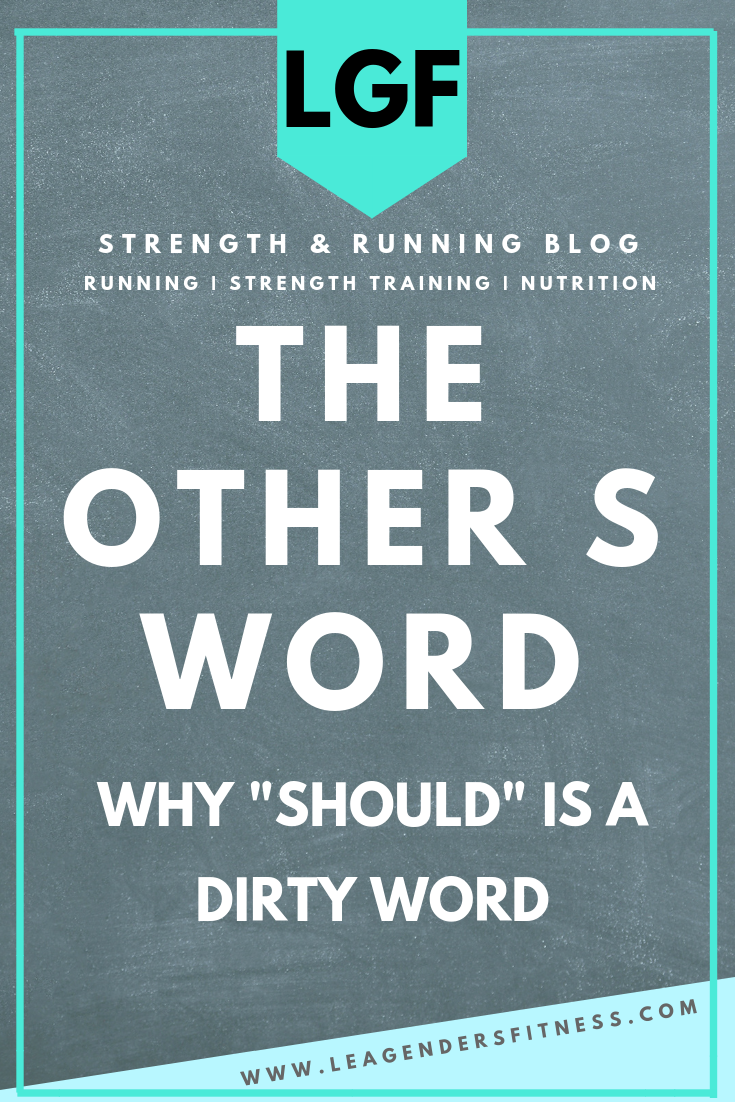Sometimes we have these ideas about what we should be doing. We should be eating more vegetables, we should be drinking less wine, and we should be sleeping more. We should wash our hair more than once a week. (What? just me?) But should is a dirty word.
The other S word. Why “should” is a dirty word. Save to your favorite Pinterest motivation board for later
THE OTHER S WORD: SHOULD IS A DIRTY WORD
Sometimes the people in our lives tell us what we should do. We should keep a stable job and not pursue our small business dreams. We should go back to school. We should put in overtime at work.
Sometimes your coach tells you what you should do. You should be exercising more. You should be eating less.
Sometimes the shoulds come from what we think people want from us. We should accept the higher paying position that comes with more responsibility and stress because it's prestigious. We go into debt to buy a bigger house because that’s what we should want.
THE PROBLEM WITH SHOULD
The problem with should is it stems from what other people want for us, or what we think we’re supposed to do, rather than what we actually want. It comes from a place of guilt rather than empowerment.
Which of these is more likely to breed positive action:
I should be drinking more water.
I want to drink more water so I’ll feel better throughout the day.
I should be running more often.
I want to run an extra day this week to reach my goals.
I should be getting up earlier.
Says who? I’ll sleep in because I am a night person.
WHAT TO DO INSTEAD OF SHOULD
Should comes from a place of shame. You feel bad about what you should be doing, but aren’t. Instead, use words such as I can, I want to, or I will in place of should for the things you want to accomplish. No one cares what you should do, they only care about what you actually do.
I DON’T COACH SHOULDS.
As a coach, I try to refrain from telling clients what they should do, but I’m not perfect.
“But Lea, as a coach, isn’t that your job? Tell people what they should do to reach their goals?”
My job as a coach is to help people reach their goals by guiding them through the steps that will get them there. Everyone’s a little different.
If I tell my client that she should eat more carbs because I personally perform well on a high carb diet, that is doing her a disservice if she is carb sensitive. Instead, I make recommendations, offer choices, get the client’s buy-in, ask for feedback and make adjustments as necessary.
I can tell a client what they should do, but if it doesn’t align with what they want, then they’re not going to do it anyway. As a coach I am not the boss barking out orders, I am the guide. No one knows your body as you do, you’ve probably been living it for at least a couple decades by now.
REFRAME THE SHOULD
I’m not suggesting that you avoid all things that you don’t want to do, rather reframe them in the context of what you do want. I don’t always want to run (yes, I’m human too) but I do want to run a race in December without dying, and that requires training. I want to run a successful race and training runs are the action I need to take to reach my goal. Training for a race aligns with my goals. Therefore, I want to run (even when I don’t feel like it).
CONSIDER THE SOURCE
If your doctor tells you that you should drink less alcohol to improve your health, consider why improving your health is important to you and decide what you want to do based on your goal of living a long time to be around for your kids or travel the world in retirement. Your doctor is probably right.
If your Aunt Sally tells you should buy a new car, it carries less weight when it doesn’t actually align with what you really want. If you value being free from monthly payments more than a fancy car, then Aunt Sally’s advice doesn’t apply here. Often other people’s advice and opinions are rooted in their own fears and insecurities, even if they mean well. What do you really want? What do you value? What’s important to you?
Forget about what you should do, and consider what you want to do, what you will do and what you can do. Align your actions with your personal goals and values. If you really want it, then you’ll take the necessary steps to get there, and you can stop “should”ing all over yourself.
Did you like this post? Do you know someone who might benefit? It helps me when you share with your friends and followers.













The single-leg deadlift is one of the most effective exercises for runners to improve balance and build independent hip and leg strength to run strong and reduce the chance of injury. Learn to perform the single-leg deadlift properly, and how to progress the exercise for continuous improvements.